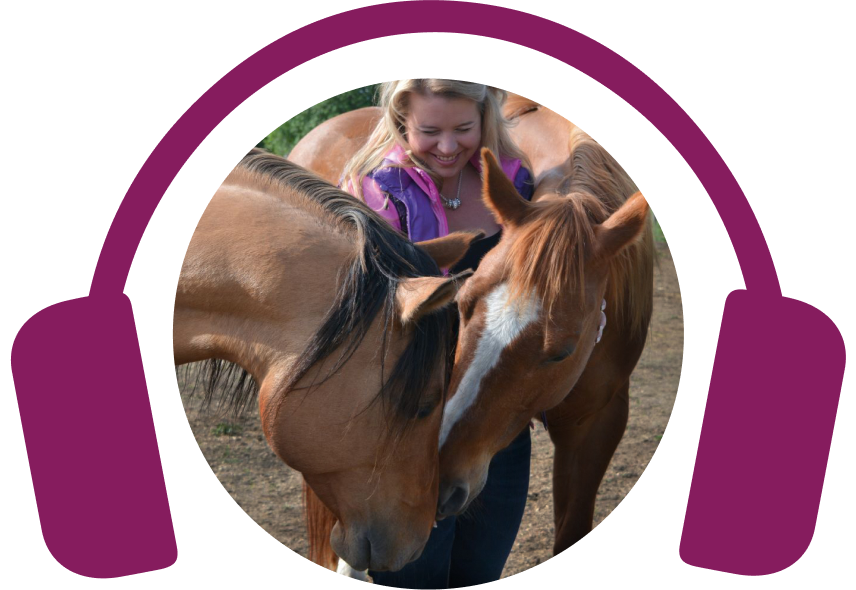Elisha’s Podcast
ELISHA’S PODCAST

Ready to get your horses on the path to better health?
This podcast was created to do just that.
Tune in to get new insights, perspectives, horse health tips, and real-life horse healing stories.
Take what you learn and apply it to your horse TODAY.

One Conversation at a time
From learning what to feed your horse and how to use nutrition effectively, to practicing prevention and approaching specific health challenges naturally, to just bringing your horse more joy and better health…
I’ve got you covered!

Check out my recent episodes
Last week, we explored the early signs of toxicity in horses. Today, we revisit a previous episode to clarify what toxicity is and how it affects your horse. Toxicity is one of the leading causes of equine disease. When the toxic load of horses exceeds what they can process, it becomes hard for their tissues to remain healthy, their organs to function as they should, and their body systems to work together to sustain good health. Today, I scratch the surface of the vast and complex topic of toxicity, giving you a little food for thought. Since this is a massive subject, I will likely revisit it and dive deeper into some of the points we cover today in future episodes. Understanding Toxicity in Horses Toxicity refers to the degree to which a substance can harm cells, tissues, organs, or entire systems. For horses, toxicity often accumulates gradually, influencing their health over time. Genetic makeup, nutrition, and environmental exposure are all factors that determine how well a horse can handle toxins. Well-nourished horses with good constitutions and minimal exposure to harmful substances are generally more resilient. Yet they can also struggle as they age, particularly between 14 and 16 years, when signs of imbalance often emerge. Early Signs of Toxicity The initial effects of toxicity can be subtle and easy to overlook. A horse may develop a dull coat, cracked hooves, or irregular shedding patterns. Some subtler changes, such as stiffness, swelling, joint discomfort, a weakened immune system, or slow recovery from illness, could also indicate that the body struggles to handle its toxic load. Key Sources of Toxicity Dietary imbalances Dietary imbalances are another major factor contributing to poor equine health. Excess sugar or protein can stress the body and lead to inflammation, metabolic issues, and poor gut health, and a diet heavy in oils can disrupt the gut microbiome. Acidity Acidity in the body often results from an imbalanced diet, leading to conditions like leaky gut, systemic inflammation, and joint issues. Hormonal imbalances, such as prolonged high cortisol or insulin levels, also cause significant damage over time, contributing to tissue breakdown, laminitis, and immune dysfunction. Antioxidants Antioxidants are crucial for combating free radicals, the unstable molecules that damage cells and DNA. Free radicals naturally occur during metabolic processes, but increase with high toxic loads. Without sufficient antioxidants to neutralize them, free radicals can accelerate aging, weaken the immune system, and cause long-term damage. The Cumulative Effect of Toxicity Even though toxins seldom cause immediate harm, they accumulate over time. A horse that has consumed feed with additives, dealt with multiple infections, or been on long-term medications may eventually show signs of toxicity. The cumulative effect often leads to nutritional deficiencies, compromised immunity, and declining health. Strategies for Reducing Toxicity Final Thoughts Toxicity develops slowly. Understanding the sources and taking steps to minimize exposure allows you to assist your horse in maintaining vitality and resilience throughout its life. Proactive care and reducing toxic burdens will ensure their long-term health and well-being. Do you know what exactly is in your horse's supplements, and what they're actually doing for their health? Keeping your horse's diet and supplement program clean is one of the most beneficial things you can do for them. There is nothing that turns a horse's health around faster than cleaning up their diet and supporting their health from the inside out. The good news is I'm going live on Saturday, December 6, 2025, at 10 am Mountain Standard Time, and I invite you to join me for my first-ever two-hour workshop called Detox Done Right: How To Reduce Your Horse's Toxic Load and Upgrade Their Health. For just $127 Canadian, you will get my hands on my label-reading playbook and my clean feed roadmap- and we will finish with a 30-minute Q&A to help turn your supplement confusion into clarity. If you care about your horse's health and want real, practical steps that lead to results, then this workshop is just for you! Save your seat by clicking on the link in the show notes, or head over to my website. No need to worry if you register and miss it because I will have a recording waiting for you, whenever you are ready- but I do hope to see you all there, live! Links and resources: Connect with Elisha Edwards on her website Join my email list to be notified about new podcast releases and upcoming webinars. Free Webinar Masterclass: Four Steps to Solving Equine Metabolic Syndrome Naturally Register for Resolving Equine Metabolic Syndrome Naturally, now. We’re talking about toxicity today. I’ve been seeing several cases lately where toxicity plays a role, so I thought it was time to revisit the topic. In episode 53, I covered the definition of toxicity and what it means for your horse, so you can go back and listen to it after this episode for more details. Stay tuned as I share the signs to look out for. Understanding Toxicity in Horses Toxicity in horses often develops slowly and subtly through accumulated exposure to feed contaminants, environmental chemicals, medications, or poor-quality diets. Unlike sudden poisoning, this buildup can take years to show outwardly. Younger horses may appear healthy despite ongoing exposure, but as they age, resilience drops and health issues surface, usually from around age 12 onward. Early Warning Signs Subtle behavioral and physical changes often signal toxicity. These can include fatigue, dull eyes, reduced social engagement, depression, or anxiety. Appetite changes are also key clues- horses that suddenly become picky or disinterested in food may be reacting to gut irritation or inflammation. Paying attention to these small shifts helps catch toxicity before it escalates. Behavior and the Nervous System Toxicity can impact the nervous system, leading to high anxiety and nervousness. While horsemanship helps build horses’ confidence, chronic anxiety can point to underlying health issues or an internal imbalance. Ulcers and overactive immunity often accompany this state, as pain and inflammation trigger more stress in a self-perpetuating cycle. Inflammation Inflammation is one of the most common consequences of toxicity. It often presents as laminitis or joint stiffness, even when blood work looks normal. Laminitis is particularly revealing as hoof tissues react early to systemic inflammation. Many arthritic horses may actually be struggling with toxic buildup rather than structural degeneration, and they often improve after detoxification. The Liver The liver detoxifies all chemicals entering the body, but chronic overload eventually leads to fatigue and dysfunction. As detoxification slows, toxins accumulate, affecting hormone balance, immune strength, and overall vitality. So, even when liver enzymes appear normal, the liver may still be under strain. The Gut–Toxicity Connection Gut health is often the first to suffer. Long-term exposure to irritants, sugars, or intolerant feeds leads to inflammation, leaky gut, and cecal acidosis. A damaged intestinal lining allows toxins to circulate through the body, causing hives, laminitis, or chronic infections. Gut inflammation also prevents nutrient absorption. Nutrient Deficiency Toxicity compounds over time. Horses with chronic gut irritation or sugar-heavy diets often experience nutrient depletion because their inflamed intestines cannot absorb key minerals and vitamins. Common Physical Signs Visible indicators include dull or coarse coats, cracking or separating hooves, weepy eyes (often linked to liver dysfunction), nasal discharge, and reduced energy. These may seem mild or age-related, but they could reflect systemic imbalance from long-term toxicity. Reversing the Effects Improvement begins with removing toxins from feed, water, and the environment. Cleaning up the diet allows the liver, kidneys, and gut to recover. Even older horses can regain their vitality after reducing their toxicity and with good nutrition. Long-Term Prevention Reducing toxicity is one of the most effective ways to prevent disease. By being mindful of feed quality, ingredient lists, and exposure sources, owners can dramatically improve their horses’ health spans and overall resilience. Do you know what exactly is in your horse's supplements, and what they're actually doing for their health? Keeping your horse's diet and supplement program clean is one of the most beneficial things you can do for them. There is nothing that turns a horse's health around faster than cleaning up their diet and supporting their health from the inside out. The good news is I'm going live on Saturday, December 6, 2025, at 10 am Mountain Standard Time, and I invite you to join me for my first-ever two-hour workshop called Detox Done Right: How To Reduce Your Horse's Toxic Load and Upgrade Their Health. For just $127 Canadian, you will get my hands on my label-reading playbook and my clean feed roadmap- and we will finish with a 30-minute Q&A to help turn your supplement confusion into clarity. If you care about your horse's health and want real, practical steps that lead to results, then this workshop is just for you! Save your seat by clicking on the link in the show notes, or head over to my website. No need to worry if you register and miss it because I will have a recording waiting for you, whenever you are ready- but I do hope to see you all there, live! Links and resources: Connect with Elisha Edwards on her website Join my email list to be notified about new podcast releases and upcoming webinars. Free Webinar Masterclass: Four Steps to Solving Equine Metabolic Syndrome Naturally Register for my self-paced course, Resolving Equine Metabolic Syndrome Naturally. Today I’m sharing winter nutrition tips for horses. As temperatures drop and the seasons shift, you will need to adjust your feeding to support your horse’s health through the colder months. I’m in Calgary, Alberta, where we experience extreme temperature swings. Wherever you live, the degree of cold you experience will influence how you should feed your horses for optimal health, and one of the most important factors to consider is your horse’s weight regulation. Managing Weight in Winter Winter poses challenges for both easy and hard keepers. Easy keepers often enter the season carrying extra weight, while hard keepers struggle to maintain condition due to increased energy demands for warmth. Managing both types requires paying attention to diet, sugar levels, and feeding strategies. Easy Keepers: Use Winter as an Opportunity Winter can help easy keepers lean out naturally. When grass is dormant or covered by snow, sugar intake gets reduced. That is ideal for managing insulin resistance, PPID, and equine metabolic syndrome. Encouraging natural movement and moderate feeding Encourage natural movement and moderate feeding by spacing hay stations far apart. Avoid free-choice hay for overweight or sugar-sensitive horses. Instead, feed in controlled portions, ideally using slow-feeding nets, ensuring they don’t stand for too long without food. Leaner winter conditioning helps restore insulin sensitivity, supports metabolism, and prepares horses for spring. Hard Keepers: Prioritize Calories and Warmth For hard keepers, maintaining weight in cold weather is essential. Offer them free-choice hay or extra feeding sessions separate from easy keepers. Provide larger mashes (such as beet pulp or alfalfa cubes) to boost calorie intake and hydration. You can use extruded feeds temporarily for better absorption and calorie density. Even if the ingredient list is not perfect, the priority is to prevent weight loss and support their muscle mass through the winter. Once spring arrives, you can detoxify them and move them back to cleaner feeds when forage becomes available. Supplements to Prevent Deficiencies When a horses shift from grass to hay, the levels of fat-soluble nutrients (especially essential fatty acids) drop sharply. Supplementation is the key to preventing deficiencies that affect skin, coat, and metabolism. Crushed flax, hemp hearts, or chia seeds are excellent plant-based sources of omega-3 and other nutrients. Oils, such as flax, camelina, or hemp, can be used short-term, but only in small amounts. They must be stored properly, however, and selected for stability. Selenium and Vitamin E Support Horses on hay-only diets are usually deficient in selenium and vitamin E, which are vital for immune function, circulation, metabolism, and hoof health. The two nutrients work synergistically, as selenium enhances vitamin E’s antioxidant action. Since hay rarely provides enough nutrition, consistent supplementation is essential. It is always best to use high-quality supplements that are free of unnecessary additives or preservatives. Carrots and Beta-Carotene Carrots provide beta-carotene, a precursor to vitamin A, and easy keepers can eat them in moderation. The fiber and phytonutrients in carrots prevent blood sugar spikes, making them a beneficial winter addition. Winter Nutrition Takeaway Winter is the perfect time to fine-tune your horse’s nutrition. Allow easy keepers to lose weight gradually on their own while ensuring hard keepers receive enough calories to stay warm and maintain their condition. Focus on good quality hay, balanced supplementation, and moderate feeding to support movement and metabolic health. By managing your horse’s sugar intake, providing essential nutrients, and keeping inflammation low, you can set your horse up for a healthier and more resilient spring. Do you know what exactly is in your horse's supplements, and what they're actually doing for their health? Keeping your horse's diet and supplement program clean is one of the most beneficial things you can do for them. There is nothing that turns a horse's health around faster than cleaning up their diet and supporting their health from the inside out. The good news is I'm going live on Saturday, December 6, 2025, at 10 am Mountain Standard Time, and I invite you to join me for my first-ever two-hour workshop called Detox Done Right: How To Reduce Your Horse's Toxic Load and Upgrade Their Health. For just $127 Canadian, you will get my hands on my label-reading playbook and my clean feed roadmap- and we will finish with a 30-minute Q&A to help turn your supplement confusion into clarity. If you care about your horse's health and want real, practical steps that lead to results, then this workshop is just for you! Save your seat by clicking on the link in the show notes, or head over to my website. No need to worry if you register and miss it because I will have a recording waiting for you, whenever you are ready- but I do hope to see you all there, live! Links and resources: Connect with Elisha Edwards on her website Join my email list to be notified about new podcast releases and upcoming webinars. Free Webinar Masterclass: Four Steps to Solving Equine Metabolic Syndrome Naturally Register for my self-paced course, Resolving Equine Metabolic Syndrome Naturally.
Meet your host
Hi there, I’m Elisha Edwards

Meet your host
Hi there, I’m Elisha Edwards
I have helped guide thousands of horses back to good health over the years from a variety of different health challenges. And through my courses, webinars, and speaking engagements I educate and empower horse owner’s from around the world to take charge of their horse’s health using the holistic model of health care.
So I know first-hand how difficult and overwhelming it can be to navigate all the different opinions and conflicting information that you come across especially when your horse is faced with a health problem. In many cases, the journey is just as hard on the owners as it is on the horses.
I started Healing Horses with Elisha to guide you, support you, and encourage you through the process of prevention and recovery so you feel good about the decisions you’re making for them.
Here’s what I believe
I have seen countless horses with seemingly impossible health conditions that have been resolved so easily with the right combination of diet, nutrition, and natural remedies. In many cases, it is not the health conditions that prevents the horse from recovering, it is the lack of education, resources, and options that are available.
If the insight and information you gain from this podcast gives you some newfound hope or inspires you to take
a new approach then it has served it’s purpose.
Thank you for giving me the opportunity to help you improve your horse’s health.
Keep listening and learning. Your horse is worth it.
Listen Now
Tune in wherever you listen to your podcasts and follow me so you never miss an episode. I release a new one every Tuesday!

Leave a Review
Reviews help me reach more horses and also help me deliver more relevant content to you!

What my Listeners are saying
“Every time I think there is no way to top what you do – you elevate us to yet another level. I wish I had a fraction of your communication skills. You’re amazing and I am so grateful to be apart of the magic you are creating for horses and their humans.”
Tracey
“Your podcasts are fantastic! I get so excited to listen to the next one. I have 6 geriatric horses and your podcast has really opened my mind to new possibilities in their health and given me the strength to help them through hiccups in their well-being the past few months. I have a nursing education and you explain pathology better than my university professors.”
Sharon
“I can’t thank you enough for the Mindset Tips podcast. I really needed this reminder. It was just what I needed to hear to today.”



